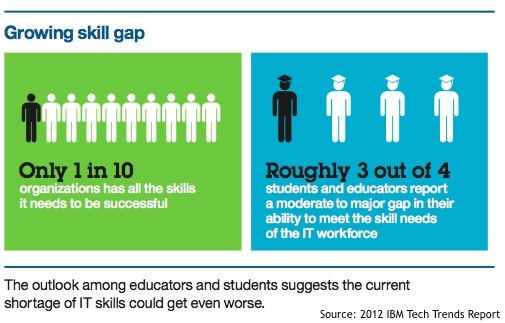IBM Report Says Security is a Top Barrier to Adoption in Business Analytics, Mobile, Social Business and Cloud
As business demand for mobile, cloud, social business, and business analytics rises, enterprises have to deal with security concerns and severe IT skill shortages, IBM said in its latest Tech Trends Report.
Only one in ten organizations has the skills needed in advanced technologies such as business analytics, mobile computing, cloud computing, and social business, IBM found in the 2012 Tech Trends Report, released Wednesday. Within each area, roughly a quarter of the respondents reported major skill gaps and more than 60 percent reported moderate-to-major shortfalls, the report said.
The skills problem was more acute in mature markets, according to the survey.
 The IBM Center for Applied Insights conducted the research and analysis for the 2012 Tech Trends Report, which is based on a survey of more than 1,200 professionals who make technology decisions for their organizations, including IT managers, IT practitioners, and business professionals around the world. The report also surveyed 250 academics and 450 students. The respondents came from 13 countries and 16 different industries, IBM said.
The IBM Center for Applied Insights conducted the research and analysis for the 2012 Tech Trends Report, which is based on a survey of more than 1,200 professionals who make technology decisions for their organizations, including IT managers, IT practitioners, and business professionals around the world. The report also surveyed 250 academics and 450 students. The respondents came from 13 countries and 16 different industries, IBM said.
“These shortages are not trivial or isolated,” and is “poised to get much worse,” IBM said.
In the survey of academics and students, roughly three out of four respondents, or 73 percent, said there was a moderate-to-major gap in the institution’s ability to meet demand for advanced skills, the report found.
Four revolutionary technologies—business analytics, cloud computing, mobile technology, and social business—are rapidly reshaping how enterprises operate, IBM wrote in the Tech Trends Report. While two-thirds of the respondents felt these information technology areas were “strategically important” to their organizations, severe skills shortages and concerns about security remain sizeable barriers, the report found.
“We are faced with one of the largest skills gap in history,” Jim Corgel, general manager of academic and developer relations at IBM, wrote on the Building a Smarter Planet blog. The new technologies could help “rekindle economic growth” around the world, but “only if we close the skills gap—and fast,” he wrote.
Businesses need to tune their radar and plot out their skills requirements for the years ahead, Corgel said. Organizations need to “build depth and breadth” in the emerging skills among employees, such as encouraging experimentation and trying out new technologies, the report found. Universities need to reassess their current programs to make sure they are incorporating real-world technology and business cases to prepare students for the jobs of the future. Students need to be placed in internships that provide them with the most up-to-date expertise, IBM said.
Security Skills Shortage
Along with the skills gap, the Tech Trends Report cited security as a barrier to technology adoption.
About 61 percent of the respondents said security was the number one barrier to adopting mobile technologies, and 56 percent named security as the top barrier for cloud computing. A little less than half, or 47 percent named security as the top barrier to the adoption of social business technologies. Business analytics was the only technology area respondents did not believe security was a top barrier, but 31 percent ranked it as the number two barrier.
To complement the findings of the Tech Trends Report, IBM announced new initiatives designed to help students and IT professionals develop new skills and prepare for jobs. They include new training courses and resources for professionals, technology and curriculum materials for educators, and programs to directly engage students. IBM expanded its Academic Initiative program to offer curriculum materials and training resources on IT security to train students with “market-ready cyber-security skills,” the company said. The materials include real-world technology security scenarios and security software for testing applications for bugs and scanning the network for vulnerabilities.
Professors and students will be able to remotely access the newest zEnterprise mainframe to work with real-world computing challenges, and have access to a variety of IBM big data offerings. Digital marketing and analytics software will be available through IBM’s Smarter Commerce initiative, as well as new hands-on learning modules for HTML5 and DOJO to teach mobile application development.
“Having a highly skilled workforce is critical to an organization’s ability to innovate, meet client demands and grow,” Corgel said in a statement.
IBM will also provide no-charge learning materials and technical resources on mobile computing, cyber-security and commerce technologies through IBM developerWorks for IT professionals. Developers will be able to access example codes, collaborate with peers around best practices, and learn more about their area. New training and certification will also be available, the company said.












